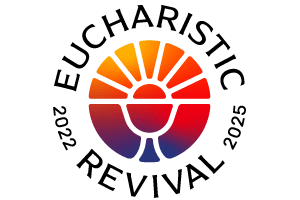Revive Alive! The Eucharistic Revival in the Diocese of Colorado Springs

"To prepare for worthy reception of this sacrament, the faithful should observe the fast required in their Church. (Cf. Code of Canon Law, canon 919) Bodily demeanor (gestures, clothing) ought to convey the respect, solemnity, and joy of this moment when Christ becomes our guest.” — Catechism of the Catholic Church, No. 1387.
Some people are willing to deny themselves bodily comforts through diet and exercise, intermittent fasting, or even simply forgetting to eat because they are busy, without much complaint. When it comes to fasting with the Church during times of Lent or for the hour fast before receiving Communion at Mass, Catholics can be less enthusiastic. Our natural tendency is to embrace things we voluntarily undertake versus those things imposed on us.
Modern man tends to value his spiritual life less than his bodily life. Therefore, he finds more motivation for things that have a physical payoff than those which are primarily for spiritual purposes. Fasting is a great example. St. Paul reminds us that every athlete exercises self-control in all things. They do it to receive a perishable wreath, but we an imperishable (1 Cor 9:25).
A modern variation could be, “ultramarathoners, YouTube influencers, and former Navy SEALS are willing to endure all sorts of insane hardships for reasons that will die when they do. But the Christian embraces hardship because the way of the cross leads to eternal life.”
When it comes to fasting, we do it for very important spiritual reasons. One of those reasons is that it trains us to prioritize the spiritual over the carnal. Our bodies need to be guided by our souls, not the other way around. When it comes to fasting, especially from food and other bodily comforts, we practice this truth. (Provided we just don’t binge once the fast is over. That puts the carnal impulse back in the driver’s seat.)
We also fast as an act of sacrifice for another. In this way we carrying out a great act of love. Never underestimate the spiritual power of fasting for others. When we deny ourselves a legitimate good out of love for another, we are speaking the very language of the cross (ref. Philippians 2:6-8). And when we give to another some material good we have denied to ourselves, we are exercising a the act of almsgiving.
Yet another reason we fast is for the purpose of preparation. The eucharistic fast in the Latin Church (our Church) is one hour before receiving Communion. (Canon 919 §1 says “A person who is to receive the Most Holy Eucharist is to abstain for at least one hour before Holy Communion from any food and drink, except for only water and medicine.” Refer to subsection 3 for the exceptions to this rule). The Communion fast used to be a lot longer and did not permit even water. This was relaxed in order to allow for the fact that modern work schedules, fewer clergy, and great distances in mission territories can prevent morning Mass attendance. It was considered unreasonable to regularly fast from midnight until attending Mass later in the day.
Fasting before Communion remains important, however, since it reminds us that “Man does not live on bread alone, but on every word that comes from the mouth of God” (Mt 4:4). Since Jesus is the Word made Flesh, whom we consume in the Eucharist, this helps orient our bodily hunger towards its spiritual satisfaction. Pope St. John Paul II lamented a lack of spiritual hunger among Catholics for the Eucharist. It is important to take seriously the hour fast before Communion because it helps to stir up such a hunger and desire for our Lord.
There may be legitimate health reasons, allowed by canon law, that serve as an exception to this important rule. But we really should examine ourselves and compare the fast before Communion to other times we do not consume something for an hour. If we can do it under those circumstances, we can do it for the Lord.
Bottom line up front: Catholics should fast for at least one hour from anything except medicine and water before receiving Communion. We do so not just because “them’s the rules.” We do so because it is a small but important way to help us experience bodily hunger, which we should then translate into spiritual hunger for the Eucharist.
The Mass is the supreme act of love for us by Jesus’ self-giving on the cross. Fasting, even in such a simple way, further prepares us for participating in that sacrificial act on the cross, to which the Eucharist unites us.
St. Augustine reminds us, “It has pleased the Holy Ghost that, to honor so great a Sacrament, the Lord’s Body should enter the mouth of the Christian before other food.”
At the very least, we should be faithful to the basic (and do-able) requirement that we fast for one hour before receiving Communion. In this season of Lent, when together we take on the disciplines of prayer, fasting, and almsgiving, it is a good time to revisit this discipline which is meant to better dispose us through an act of love for Jesus in the Eucharist. Let’s not miss the great spiritual value of something so simple!
850